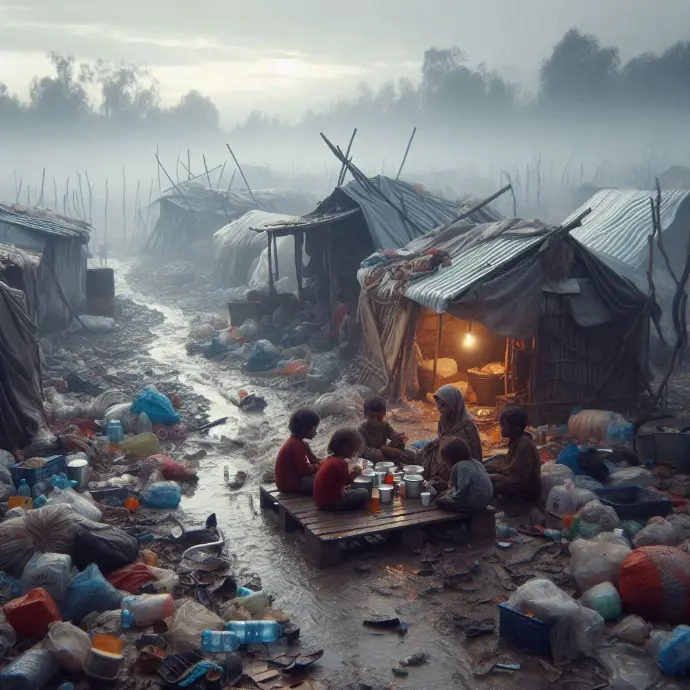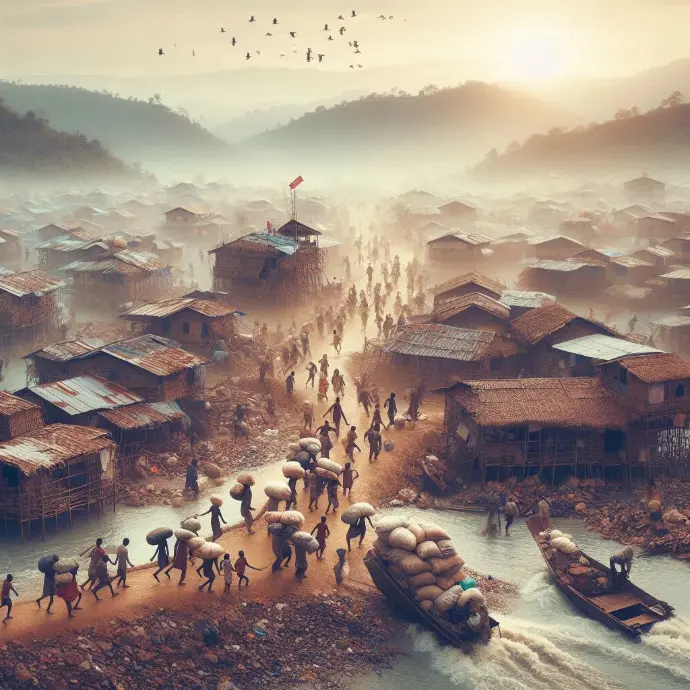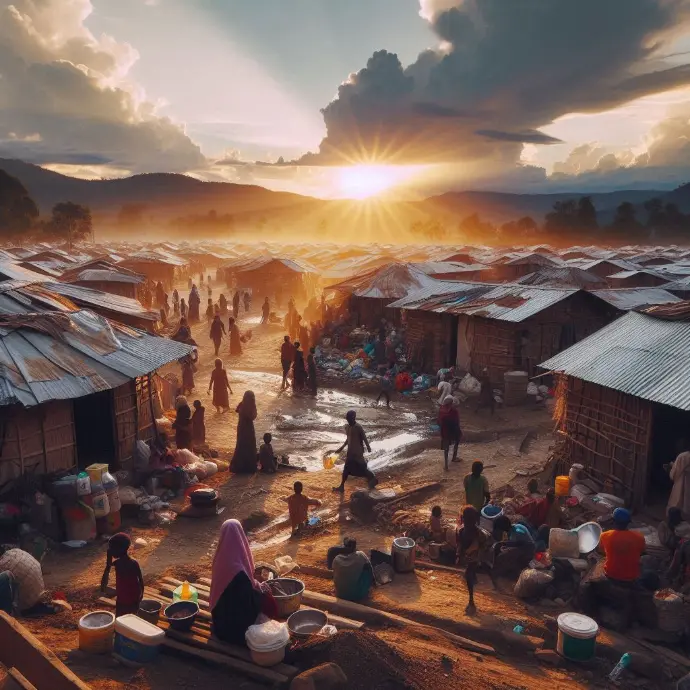In this space dedicated to the exhaustive exploration and in-depth analysis of global human rights, you will find crucial information on the global human rights challenge. Dive into our feature article "Poverty and Climate Change: A Global Human Rights Challenge." Prepare to discover how these issues directly impact the lives of millions of people around the world. Keep exploring and expand your understanding of this important topic!
Introduction
The relationship between poverty and climate change is complex and multidimensional. The poorest and most vulnerable communities are those that suffer disproportionately from the effects of climate change, despite contributing minimally to greenhouse gas emissions. Lack of resources and geographic location expose these communities to extreme weather events, such as droughts, floods, and storms, which affect their food security, health, and livelihoods.
Furthermore, poverty limits these communities' ability to adapt to climate change, as they lack access to resilient infrastructure, early warning services, and social protection systems. Furthermore, subsistence economic activities that directly depend on natural resources, such as agriculture and fisheries, are affected by environmental degradation and biodiversity loss, perpetuating the cycle of poverty and vulnerability.
It is crucial to understand that poverty and climate change are intrinsically interconnected, and addressing one without considering the other can result in incomplete and ineffective solutions.
The impact of the link between poverty and climate change on human rights globally is significant. Access to a healthy environment, clean water, adequate food, decent housing, and health are fundamental human rights that are threatened by climate change, especially for communities experiencing poverty.
Alterations in weather patterns and extreme weather events can trigger forced displacement, conflict over scarce resources, and increased vulnerability to disease. This jeopardizes the right to life, security of person, adequate housing, and an adequate standard of living, as established in the Universal Declaration of Human Rights and other international human rights treaties.
Furthermore, climate change disproportionately affects future generations, violating their right to inherit a habitable planet. Therefore, addressing the challenge of poverty and climate change is essential to protecting and guaranteeing fundamental human rights globally.
Conducting a comprehensive analysis of the intersection between poverty and climate change is critical to understanding the complexity of this global human rights challenge. This analysis identifies the specific ways in which climate change affects impoverished communities, as well as the gaps in the protection of their rights.
Furthermore, a detailed analysis provides the basis for developing effective strategies that address both poverty and climate change holistically. This includes implementing policies that strengthen the resilience of vulnerable communities, promoting sustainable technologies, and mobilizing financial resources for climate change adaptation and mitigation in contexts of poverty.
A comprehensive analysis is the crucial first step in designing and implementing effective responses that protect the human rights of communities affected by the intersection of poverty and climate change on a global scale.
Global Human Rights Challenge
The global human rights challenge refers to the complex web of issues affecting communities around the world in relation to the protection and promotion of human rights. This challenge encompasses a wide range of issues, from extreme poverty and inequality to climate change and forced migration, among others. The magnitude of this challenge is such that it requires comprehensive attention and in-depth analysis to understand the intersection of these issues and their global implications.
In this sense, addressing the global human rights challenge involves recognizing the interconnectedness of global problems and the need to find comprehensive solutions that address both the root causes and manifestations of these issues.
It is essential to understand that the global human rights challenge is not limited to a particular country or region, but affects humanity as a whole, requiring coordinated and collaborative responses at the international level.
The intersection between poverty, climate change, and human rights is a fundamental aspect of the global human rights challenge. Poverty is often closely linked to vulnerability to the impacts of climate change, which in turn disproportionately affects the human rights of the most marginalized communities.
People living in poverty often depend directly on natural resources for their livelihoods, making them especially vulnerable to natural disasters, food shortages, and limited access to safe drinking water. These challenges, exacerbated by climate change, negatively impact fundamental rights such as the right to food, the right to an adequate standard of living, and the right to health.
Furthermore, climate change can exacerbate poverty by affecting agricultural productivity, the availability of water resources, and the economic stability of communities, which in turn has a direct impact on the realization of human rights.
The global implications of the global human rights challenge are significant and require a coordinated response from the international community. The impact of climate change on poverty and human rights transcends borders, making it a problem that demands global action.
The communities most affected by this intersection of problems are often located in developing countries, highlighting the need for solidarity and support from developed countries to address these issues equitably and fairly.
Furthermore, the global human rights challenge requires a comprehensive approach that recognizes the interconnectedness of the problems and promotes sustainable solutions that address not only the symptoms but also the root causes of poverty, climate change, and human rights violations.
The term "global human rights challenge" refers to the complex intersection between poverty and climate change and their impact on human rights on a global scale. This challenge represents a series of interconnected obstacles that affect people's ability to enjoy their fundamental rights, such as access to food, clean water, adequate housing, healthcare, and a healthy environment.
The semantic variant "global human rights challenge" also encompasses the need to address the economic and social disparities that perpetuate poverty and exacerbate the effects of climate change on vulnerable communities around the world. Furthermore, it implies the urgency of finding sustainable solutions that protect and promote human rights in the context of a constantly changing planet.
The concept of a "global human rights challenge" highlights the interconnectedness between poverty, climate change, and human rights and underscores the need to address this complex landscape in a comprehensive and collaborative manner at the international level.
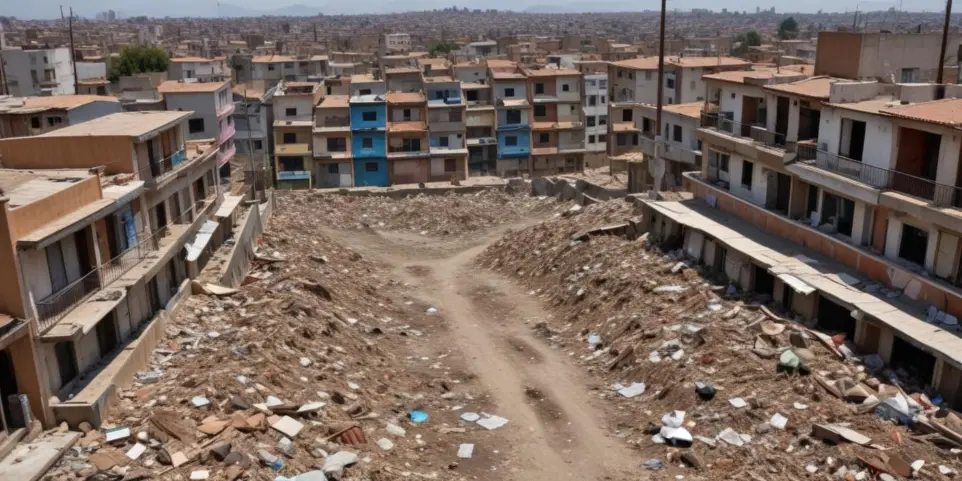
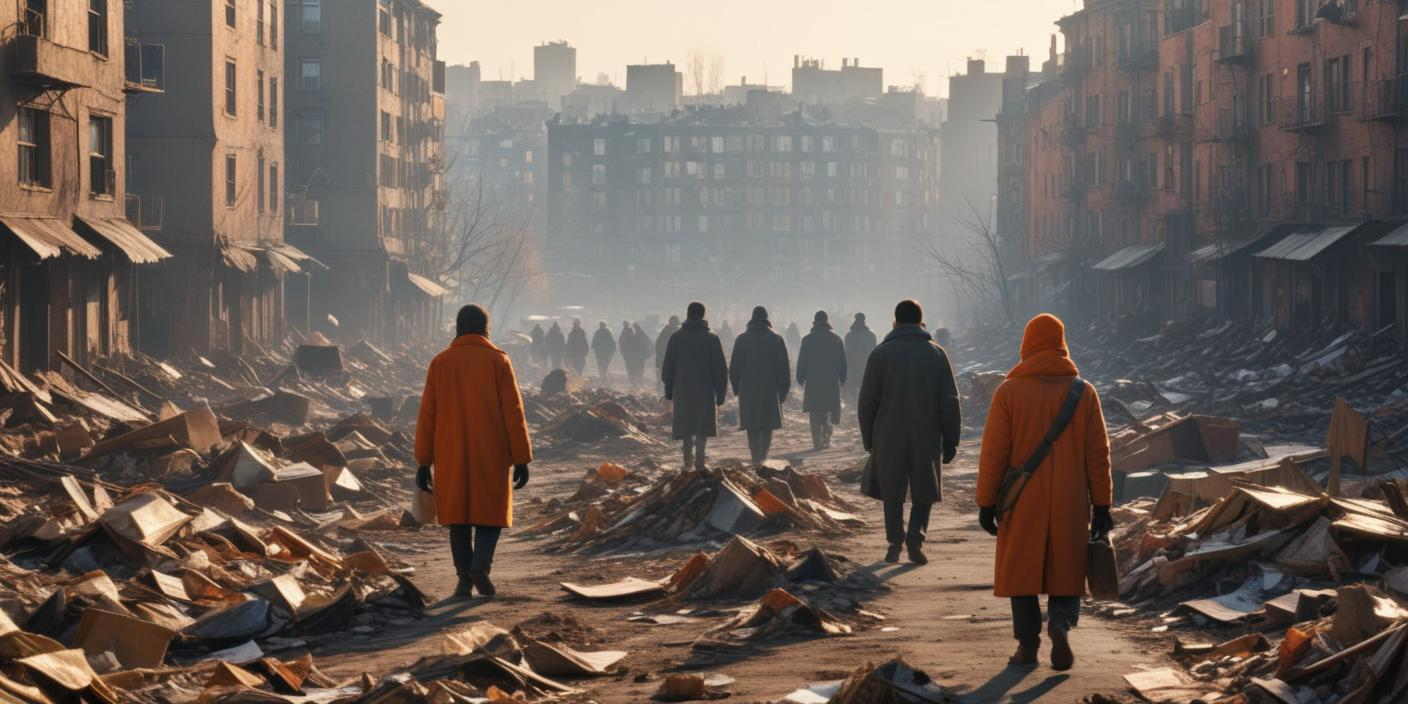
Analysis of the Current Situation
According to the United Nations Development Program (UNDP), approximately 734 million people live in extreme poverty, surviving on less than $1.90 a day. Furthermore, the Intergovernmental Panel on Climate Change (IPCC) has warned that climate change could push more than 100 million people into extreme poverty by 2030.
Furthermore, it is estimated that between 2030 and 2050, climate change will cause approximately 250,000 additional deaths per year, due to malnutrition, heat stress, vector-borne diseases, among other factors.
These alarming data highlight the intersection between poverty and climate change, creating a global human rights challenge.
The most vulnerable communities, such as those that depend directly on agriculture or fishing for their livelihoods, are particularly affected by climate change. Extreme climate changes, such as prolonged droughts or flash floods, can decimate crops and reduce food availability, disproportionately affecting those already living in poverty.
Furthermore, these communities often lack the resources to adapt to the effects of climate change, increasing their vulnerability. Land loss, shortages of clean water, and the rise of climate-related diseases such as dengue fever and malaria further exacerbate their situation.
It is critical to understand that climate change is not only an environmental threat but also a human rights challenge that disproportionately affects the most marginalized communities.
Faced with this complex issue, the international community has recognized the need for coordinated and sustained action. Agreements such as the Paris Agreement seek to mitigate and adapt to the effects of climate change, with a special focus on protecting the most vulnerable communities.
Furthermore, assistance and financing programs have been developed to help affected communities adapt to climate change and build resilience. It is critical that these initiatives be strengthened and expanded, ensuring that no group is left behind in the fight against poverty exacerbated by climate change.
The global human rights challenge posed by the intersection of poverty and climate change requires continued commitment and concrete actions at the local, national, and international levels.
Currently, the intersection between poverty and climate change represents a significant challenge to human rights on a global scale. Extreme poverty is exacerbated by the impacts of climate change, resulting in the deprivation of fundamental rights for millions of people around the world. This situation raises the need for a comprehensive assessment that considers the multiple semantic variants associated with the interaction between poverty and climate change, as well as their impact on human rights.
From a human rights perspective, it is crucial to analyze the semantic variants surrounding this global challenge. This involves examining how poverty, inequality, forced migration, food insecurity, and lack of access to basic services are intrinsically linked to climate change. An assessment of the current situation must consider the different dimensions of this problem, including both its structural causes and its immediate consequences for the most vulnerable communities.
Furthermore, it is essential to recognize that the semantic variations surrounding poverty and climate change encompass not only material aspects but also cultural, social, and political aspects. This in-depth analysis will allow us to understand the complexity of the situation and design effective strategies that comprehensively address this global human rights challenge.
Actions and Solutions
Government policies play a fundamental role in addressing the global human rights challenge of poverty and climate change. It is crucial that governments implement comprehensive strategies that address both poverty and the impact of climate change on the most vulnerable communities. These policies must include concrete measures to mitigate the effects of climate change, as well as sustainable development programs that promote the economic and social inclusion of affected populations.
The effectiveness of these policies can be assessed through specific indicators, such as the reduction of extreme poverty, access to basic services such as safe drinking water and sanitation, and the implementation of sustainable practices in key sectors such as agriculture and energy. It is essential that governments be held accountable for the real impact of their policies on improving the living conditions of those most affected by the intersection of poverty and climate change.
Transparency and citizen participation are essential elements to ensure that these policies are truly effective and respond to the real needs of communities. Furthermore, international cooperation and policy harmonization among countries are crucial aspects in addressing a challenge of such magnitude and global scope.
Non-governmental organizations play a vital role in promoting and protecting human rights in the context of poverty and climate change. Through specific programs and projects, these organizations can provide direct support to affected communities, offering humanitarian assistance, promoting community participation in decision-making, and advocating for public policies that address the underlying causes of poverty and the impact of climate change.
Furthermore, NGOs can play a crucial role in raising public awareness and educating them about the interconnectedness between poverty and climate change, fostering global solidarity, and promoting shared responsibility in the search for sustainable solutions. These initiatives may include awareness-raising campaigns, sustainable skills training programs, and community development projects that strengthen the resilience of vulnerable populations to the effects of climate change.
It is essential that these initiatives be developed in close collaboration with local communities, respecting their traditional knowledge and recognizing their role as active agents in the search for solutions. Collaboration between non-governmental organizations, governments, and other relevant actors is essential to maximize the impact and sustainability of these initiatives.
The active and meaningful participation of civil society is an essential component in addressing the global human rights challenges related to poverty and climate change. Affected communities, human rights defenders, community-based organizations, and other civil society actors play a critical role in identifying priority needs, denouncing rights violations, and mobilizing for the implementation of effective solutions.
Civil society can lobby governments and other institutions to ensure that policies and programs designed to address poverty and climate change are inclusive, equitable, and sustainable in the long term. Through participation in decision-making processes, civil society can contribute to the formulation of more effective policies and the monitoring of their implementation, ensuring accountability and transparency at all stages of the process.
Furthermore, civil society can play a crucial role in raising public awareness, mobilizing citizen support, and promoting greater commitment to the protection of human rights in the context of poverty and climate change. Collaboration between civil society and other actors, including governments and international organizations, is essential to ensuring comprehensive and sustainable responses to this global challenge.
Addressing the challenge of poverty and climate change from a human rights perspective requires the implementation of comprehensive and sustainable strategies. These strategies must address both the underlying causes and the immediate consequences of these interrelated phenomena. It is essential to recognize the interconnectedness between poverty and climate change, as well as their disproportionate impact on the most vulnerable and marginalized communities around the world.
One of the semantic variants for addressing this challenge is the implementation of policies and programs that promote gender equality and women's empowerment. Various studies have shown that empowering women through education, access to economic resources, and participation in decision-making can significantly contribute to poverty reduction and climate change adaptation in communities.
Another strategy is to promote sustainable development models that integrate environmental, social, and economic considerations. This involves encouraging the adoption of clean technologies, the sustainable management of natural resources, and the creation of green jobs. At the same time, it is crucial to ensure the meaningful participation of local communities in the planning and implementation of these initiatives, while respecting and protecting their human rights.
Impact on the Global Human Rights Agenda
The intersection of poverty and climate change poses significant challenges for international legal frameworks related to human rights. As climate change exacerbates poverty, the need for a more comprehensive approach that addresses both environmental protection and the guarantee of human rights becomes evident. In this regard, several international treaties and conventions, such as the International Covenant on Economic, Social and Cultural Rights, have recognized the importance of protecting human rights in the context of climate change and poverty. However, the effective implementation of these provisions remains a challenge, and greater commitment from the international community is required to ensure that legal frameworks adequately address this complex interrelationship.
Furthermore, poverty and climate change pose unique challenges in terms of forced migration and population displacement. As communities face environmental degradation and loss of livelihoods due to climate change, they are forced to move in search of safer living conditions. This highlights the need for a legal framework that addresses not only the protection of human rights in the context of poverty and climate change, but also the protection of the rights of climate refugees and displaced communities.
The implications of the intersection between poverty and climate change for international legal frameworks require a comprehensive approach that recognizes the interdependence of human rights, the environment, and sustainable development.
The interrelationship between poverty and climate change is also intrinsically linked to other global challenges, such as food security, gender equity, and public health. The impact of climate change on the availability of natural resources, such as water and arable land, disproportionately affects impoverished communities, exacerbating food insecurity and poverty. Similarly, women, who represent a large proportion of the world's poor, face additional burdens due to gender inequality in access to resources and opportunities. This intersection between poverty, climate change, and gender equity highlights the need to address these issues holistically to achieve a significant impact on the fulfillment of human rights.
Furthermore, climate change also has direct implications for public health, contributing to the spread of climate-related diseases, an increase in natural disasters, and ecosystem disruption. These impacts disproportionately affect impoverished communities, which have fewer resources to adapt to these changes and face greater risks to their health and well-being. Therefore, addressing the intersection between poverty and climate change is critical to addressing global health and well-being challenges.
The relationship between poverty and climate change highlights the interconnectedness of various global challenges and underscores the need for comprehensive and collaborative approaches to effectively address these issues.
Given the complexity of the intersection between poverty and climate change, it is essential to develop new approaches and guidelines that comprehensively address these challenges. This includes the need for policies and programs that recognize the interdependence of environmental protection and the guarantee of human rights, as well as the need for monitoring and accountability mechanisms that assess the impact of these policies on the most affected communities.
Furthermore, the development of human rights-based approaches to addressing climate change and poverty requires the active participation of affected communities, as well as an inclusive approach that recognizes the different realities and needs of vulnerable populations. This implies the need to create spaces for meaningful community participation in decision-making and the design of adaptation and mitigation strategies.
Ultimately, the development of new approaches and guidelines to address the intersection between poverty and climate change requires a renewed commitment to social justice, equity, and sustainability at the global level. This implies the need for collaboration between governments, international organizations, civil society, and the private sector to implement innovative solutions that comprehensively address these urgent challenges.
The relationship between poverty and climate change has begun to gain prominence on the global human rights agenda. The interconnectedness of these two phenomena has led to greater recognition of the need to address poverty comprehensively, considering its relationship with environmental degradation and climate change. This holistic approach recognizes that poverty is not only the result of a lack of economic resources but also of the degradation of the environment in which the most vulnerable communities live.
The influence of these semantic variants on the global human rights agenda is reflected in the growing convergence of efforts to address both poverty and climate change as interrelated challenges. International organizations, governments, and activists have begun to promote integrated approaches that seek to address the root causes of poverty while simultaneously addressing the environmental crisis. This broader perspective has led to a shift in the way sustainable development policies and programs are conceived and implemented, recognizing the need to safeguard human rights in a context of increasing environmental pressure.
The inclusion of these semantic variants in the global human rights agenda has generated new impetus for international cooperation in the fight against poverty and climate change. As the interdependence of these challenges is recognized, the call for globally coordinated action to effectively address the structural causes of poverty and environmental degradation is strengthened. This evolution in the global human rights agenda highlights the need for innovative and collaborative approaches that recognize the complexity of the challenges facing humanity in the 21st century.
Conclusions
Final Reflections on the Intersection of Poverty, Climate Change, and Human Rights
The intersection of poverty, climate change, and human rights is a complex issue that requires urgent attention and a comprehensive approach. Poverty, especially in the most vulnerable communities, is exacerbated by the impacts of climate change, which in turn negatively affects the enjoyment of basic human rights, such as access to clean water, nutritious food, and adequate housing. It is crucial to recognize that these issues are interconnected and require holistic solutions that address both mitigating the effects of climate change and eradicating poverty.
Furthermore, it is critical to consider gender perspectives and social inequalities when addressing this intersection, as women and marginalized communities are the most affected. A focus on climate justice and the protection of human rights is essential to ensure that responses to these challenges are equitable and effective.
Addressing the intersection of poverty, climate change, and human rights requires a comprehensive, inclusive, and equity-oriented approach to achieve a meaningful impact on the lives of those most affected.

 IHRO NEWS
IHRO NEWS